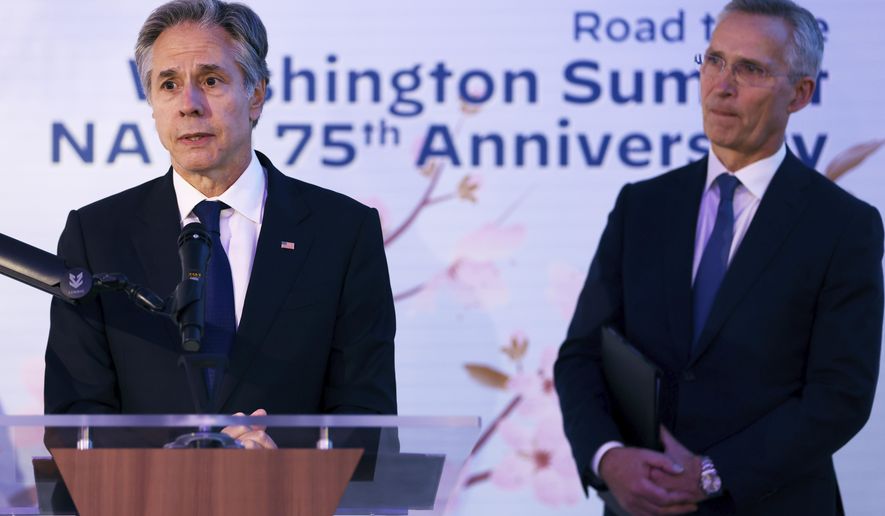A version of this story appeared in the daily Threat Status newsletter from The Washington Times. Click here to receive Threat Status delivered directly to your inbox each weekday.
NATO foreign ministers met Thursday in Brussels as the alliance marked its 75th year of collective defense in Europe. The topic was Russia’s 2022 invasion of Ukraine, the largest attack on a European country since World War II.
The anniversary comes as NATO members grapple with plans to provide more military support to Kyiv, which is plagued by ammunition shortages. Ukrainian Foreign Minister Dmytro Kuleba appealed to the 32-nation alliance to send air defense weapons to counter Russian ballistic missile attacks.
The gathering also serves as a warm-up for a summit President Biden will host for other NATO leaders in Washington in July.
“It is impossible to comprehend why allies cannot find additional batteries to deliver them to the place where ballistic missiles are being fired at every day,” Mr. Kuleba said.
In March, Russia launched an average of three ballistic missiles into Ukraine every day, Mr. Kuleba said ahead of the meeting.
“There is no other place in the world where this happens,” he said. “Therefore, it makes sense to deliver more Patriot (missile) systems to Ukraine to defend the skies.”
Mr. Kuleba met later with Secretary of State Antony Blinken. A readout of the meeting provided by the State Department said the two discussed “ways to bolster Ukraine’s energy sector in light of continued attacks from Russia” and the need for Congress to pass a stalled $60 billion military aid package for Kyiv.
On April 4, 1949, the foreign ministers of 12 countries in Europe and North America came together to sign the North Atlantic Treaty to create the alliance. NATO kept the peace through the long years of the Cold War, from the Berlin Airlift to the fall of the Berlin Wall, NATO Secretary-General Jens Stoltenberg noted in the anniversary celebration.
Mr. Stoltenberg served in Norway’s army from 1979-80.
“If there was a war, we would be on the front line, but I was not afraid,” he said. “I knew we were not alone. We had the might of the NATO alliance behind us.”
Europe needs America for its security, but also North America needs Europe, Mr. Stoltenberg said.
“European allies provide world-class militaries, vast intelligence networks, and unique diplomatic leverage multiplying America’s might,” he said. “Through NATO, the United States has more friends and more allies than any other major power.”
Mr. Stoltenberg said he doesn’t believe America or Europe can succeed on their own.
“I believe in America and Europe together in NATO,” he said. “We are stronger together.”
But the summit has also provided an opening for skeptics who say the Western military alliance, now grown to 32 countries, has outgrown its purpose more than three decades since the collapse of the Soviet Union.
“Some who celebrate this anniversary misinterpret the alliance as being the guarantor of trans-Atlantic economic, political, and cultural ties. The truth is almost certainly the inverse,” wrote Christopher McCallion, an analyst with the intervention-skeptical Defense Priorities think tank. “The United States can steadily remove its military presence from Europe and shift security burdens to its wealthy allies while retaining the strong bonds of friendship and cooperation that benefit both sides of the Atlantic.”
The alliance also could face an uncertain future if former President Donald Trump returns to the White House in November’s U.S. elections. Mr. Trump has repeatedly questioned the need for the alliance and criticized fellow NATO nations that have failed to meet defense spending benchmarks.
• Mike Glenn can be reached at mglenn@washingtontimes.com.




Please read our comment policy before commenting.